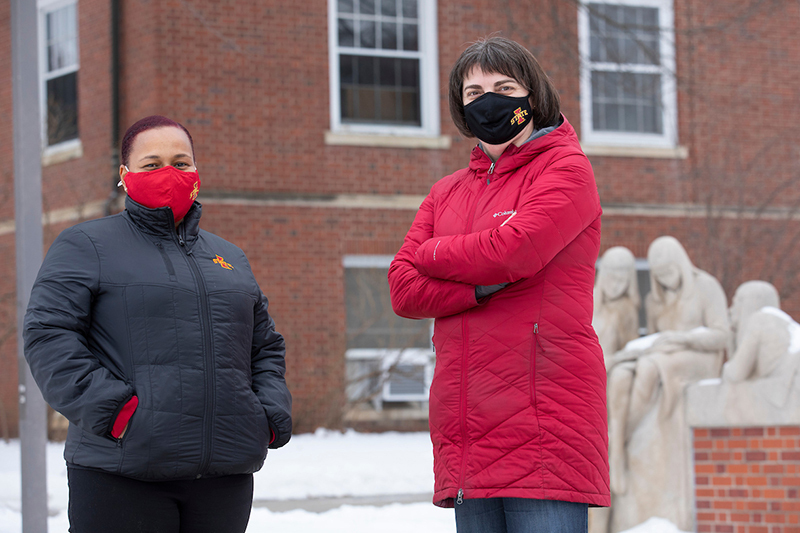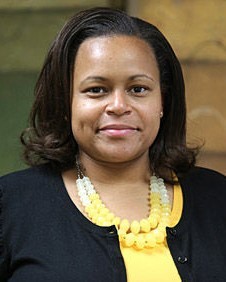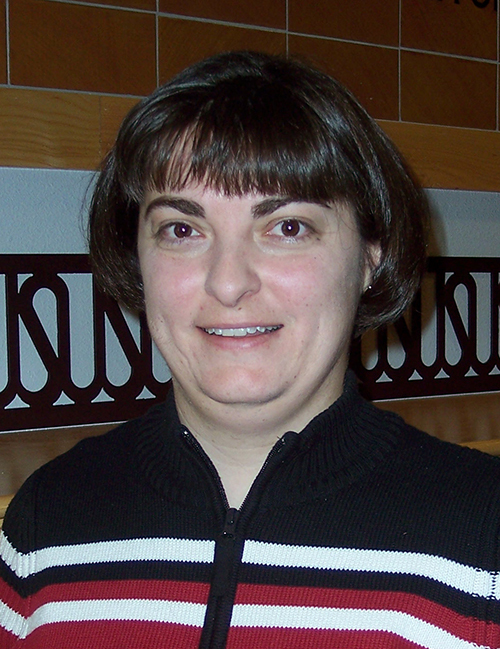
Residence Life director Virginia Speight (left) and associate director Susan Lammers served as live-in advisors to students assigned to isolation or quarantine housing during fall semester. Photo by Christoper Gannon.
As she readied for an extended student move in and mandatory COVID-19 testing last July, residence life director Virginia Speight had her own move to complete. An Ames home renter the last four years, she let her lease expire, stored much of its content and moved with her Rottweiler, Jeanny, into the two-bedroom hall director's apartment in Oak-Elm residence hall, the designated quarantine residence for Iowa State students exposed to COVID-19. Across the Richardson Court quadrangle, Linden Hall housed students isolated after a positive test for the virus.
Speight and one of her associate directors, Susan Lammers, opted to serve as live-in advisors to the students temporarily assigned to one of the buildings. If they couldn't find the fix themselves, they knew who on campus could. They envisioned it as an after-five and weekends emergency assignment, with the two professionals tag-teaming on a weekly cycle. Lammers moved into the Linden Hall director's apartment when it was her week.
Speight said three factors steered their decision:
- To protect all students, Iowa State would provide isolation and quarantine residences -- and staff them 24/7.
- So early in the pandemic, there were no best practices to draw from.
- She wouldn't place the department's hall directors or community advisors in the assignment.

Virginia Speight
"That's not what they signed up for," Speight said. "We talked briefly about contracting it out, but my brain kept asking, 'Virginia, is this something you could do -- provide a direct connect to the residence life piece -- given where you are personally and professionally?'
"I knew I couldn't do it alone," she continued. "With the commitment Susan has to the institution, our students, the department -- and her history here living on campus -- I knew she was a partner I could count on. So I asked."
Lammers, who served as resident advisor in Oak-Elm as a Cyclone undergraduate and last worked as an ISU hall director in 2006, ran through the same self-assessment.

Susan Lammers
"It came down to: Somebody has to do it, we have to serve these students," she said. "The word 'isolation' is so counter to what we believe in, in residence life. We're about community and helping people build connections. I kind of had to rewire my brain in the beginning, reframe how to help them feel connected."
The answer, Lammers said, was to answer every email, every phone call, no matter how big or small the question.
"Thank goodness Virginia and I had each other, because it was some of the most stressful work I've done in residence life," she said.
Busy start
In fact, it would be mid-September before the gig settled into a nights and weekends job. With COVID-19 testing required for campus move in, and with more than 400 students getting tested daily Aug. 3-16, they knew August would challenge them -- and it did. During the peak weeks, about 130 students were assigned to isolation or quarantine (I/Q) campus housing. The work often was double that because in addition to serving their students, Speight and Lammers were serving parents, too. It was a time of nearly constant phone conversations.
"Parents on the phone had one piece of information: My child has to move into quarantine housing," Lammers said. "They didn't know where to start, and we had to be dialed into that need, too, for weeks.
"I don't know how many times I said 'I'm not a doctor' or 'I'm not a public health official.' But that didn't mean I didn't need to reassure them that their student was safe and being cared for."
Team effort
When residence students tested positive for COVID-19, Speight or Lammers received that information from the Thielen Student Health Center. They contacted each student to see who was moving home and who would stay on campus. Then they assigned rooms in Oak-Elm or Linden to those staying, updated ISU Dining about meal delivery and alerted a team contracted from Nationwide to clean rooms, move students' belongings into them and deliver meals to their doors. Speight said students could bring as much as they wanted to their temporary room: TV, video game console, Netflix account, etc.
Once students arrived, Speight or Lammers went to work, answering emails and phone calls and running errands: find a forgotten pillow back in their room, pick up a thermometer at Thielen Student Health Center, buy a box of tissues, retrieve a video game, pick up mail at their residence hall, whatever it took.
Other residence life staff assisted during the work day -- Speight and Lammers still were trying to lead their residence life team, too -- but after five, it fell to the one on duty.
"With every interaction, they needed to know we cared. They had to know that if they had a question at 2 a.m., that phone was going to be answered," Speight said. "You have to 'hug' them through every interaction you have with them on the phone. Or when you bring something to their door, not have a look on your face that says 'I know you have COVID.'"
Both leaders said they observed the change in students, from being angry or scared initially about their COVID exposure, to being grateful for the services they received.
"After 24 hours, they understood we were going to help them be successful in that space," Speight said.
Double duty
Noteworthy effort
For her marathon service, Virginia Speight received a COVID-19 Exceptional Effort Award in student support "for managing the logistics for students needing quarantine and isolation spaces, comforting nervous students and responding to anxious parents."
About the time student numbers in isolation or quarantine started to ease a bit in mid-September, Lammers' family suffered a medical emergency. While she continued to do her first job, she no longer was able to share night/weekend duty with Speight on Richardson Court. So, Speight committed to finishing the semester herself, and the department brought in a temporary employee to help during the day with the administrative tasks of I/Q housing.
"It was for the students, but it also was for my staff," she said. "COVID is so stressful for my staff. The point of our work is to be attached, connected and engaged, so to have to stand down and step back is really hard for all of us."
Speight estimates she assisted 30-40 students at a time through October and then the numbers finally dropped off. For a couple weeks at semester break, the halls were empty. When students returned to Ames for winter session or jobs, one or two typically lived in I/Q housing.
The plan this spring? Speight will remain in her Oak-Elm apartment and continue to cover nights and weekends.
"We have very good administrative help during the day, and we have all our campus partners who back us up. Certainly, this is not something we could do, or did do, alone," Speight said. "We hope our numbers stay low, but with fall semester behind us, I do feel better about what to expect for spring. We'll make it work."
